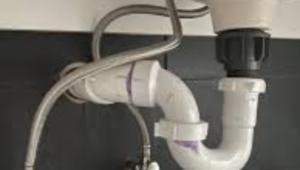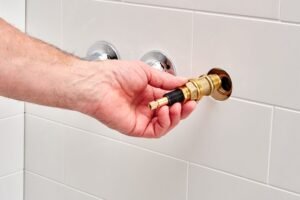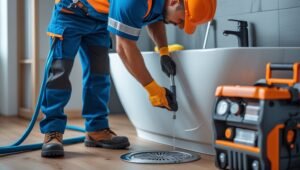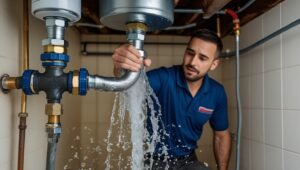Plumbers are essential for installing and repairing pipes, drainage systems, and fixtures in both homes and commercial properties. Whether you’re dealing with a leaky faucet or planning a bathroom renovation, having a reliable plumber on hand can save you both time and money. With so many service providers available, choosing the right plumber for your project can be overwhelming. This guide will help you understand what qualifications to look for and the key questions to ask before hire a plumber.
Plumber Qualifications: What to Look For Hire a Plumber
When hiring a plumber, it’s important to make sure they have the right skills and credentials. Plumbing problems often require immediate attention to avoid further damage, such as frozen water lines or backed-up sewer systems. Here’s what to check for when hiring a plumber.
Training and Experience
While a college degree isn’t required to become a plumber, most plumbers learn the trade through apprenticeships or trade schools. An apprenticeship, where plumbers work under the guidance of a journeyman or master plumber, usually lasts between three to five years. This training helps them develop the necessary skills to handle various plumbing jobs.
Licensure
In most states, plumbers are required to have a license. The licensing process ensures that the plumber is experienced, up-to-date on plumbing trends, and has received ongoing training. A valid license also means that the plumber carries the necessary insurance and bonding, protecting your home from potential damage during the job. Always verify the plumber’s license with your state’s regulatory board.
Insurance
A reputable plumber should carry general liability insurance. This protects you in case the plumber damages your property or injures themselves while working. Before hiring, ask to see proof of insurance. It’s also a good idea to check whether your homeowner’s insurance covers plumbing issues, especially in cases of sudden water damage from a burst pipe.
Journeyperson vs. Master Plumber
When hiring a plumber, you may come across terms like journeyperson and master plumber.
Journeyperson
A journeyperson is a plumber who has completed an apprenticeship and passed the required licensing exams. They are fully qualified to handle most plumbing jobs and will have an occupational license that proves their expertise.
Master Plumber
A master plumber is a professional who has worked for at least five years as a journeyman, has received additional training, and has passed advanced exams. Master plumbers can handle more complex plumbing tasks and often charge higher rates due to their extensive experience.
Services Offered by Our Plumbers
Plumbers are responsible for installing and maintaining various types of piping systems in residential and commercial properties. Here’s a breakdown of common plumbing services:
- Sewer/Water Line Replacement: Repair or replace damaged sewer or water lines.
- Pipe Repair and Replacement: Fix leaks or install new piping systems.
- Appliance Installation: Set up dishwashers, washers, and dryers.
- Drain Cleaning: Clear clogged drains and prevent future blockages.
- Garbage Disposal Services: Install or repair garbage disposals.
- Water Heater Repairs: Fix or replace malfunctioning water heaters.
- Fixture Installation: Install or replace faucets, sinks, and other plumbing fixtures.
How to Hire the Right Plumber
To hire a reliable plumber, you need to do some research. Here are steps to follow:
1. Research Local and National Companies
Start by researching both local and national plumbing companies. Look for online reviews and ask friends or family for recommendations. A plumber with a good reputation and positive customer reviews is more likely to deliver quality service.
2. Verify Licenses and Insurance
Make sure the plumber you hire is licensed and insured. You can often verify this information through your state’s Department of Labor or an equivalent agency.
3. Conduct Interviews
Once you’ve narrowed down your list, call the plumbers to discuss rates, qualifications, and experience. This is a great opportunity to ask any specific questions you have about your project.
Key Questions to Ask Before Hiring a Plumber
When speaking with a plumber, be sure to ask the following questions:
- Are you licensed and insured?: Confirm their credentials to ensure you’re hiring a legitimate professional.
- Do you charge hourly or a flat rate?: Understand their pricing structure so there are no surprises.
- Can you provide references?: Ask for references from previous clients to confirm their quality of work.
- Do you have experience with this type of job?: Ensure they’ve worked on similar projects before.
- What are your payment terms?: Clarify when and how payment is expected.
- Can I get an estimate in writing?: A written estimate protects you from unexpected costs.
Tips for Choosing the Best Plumber
Here are additional tips to help you select the right plumber:
- Check Reviews and Competitors: Read reviews from other homeowners in your area, and compare quotes from multiple plumbers.
- Use the Better Business Bureau (BBB): Research the plumber or company on the BBB website to check for complaints or issues.
- Ask for a Written Estimate: A professional plumber should provide you with a written estimate that outlines the scope of work and associated costs.
Conclusion
Hiring the right plumber for your project can prevent costly mistakes and ensure the job is done correctly. By researching thoroughly, checking credentials, and asking the right questions, you can feel confident in your choice. A little effort upfront can save you a lot of trouble down the road.






